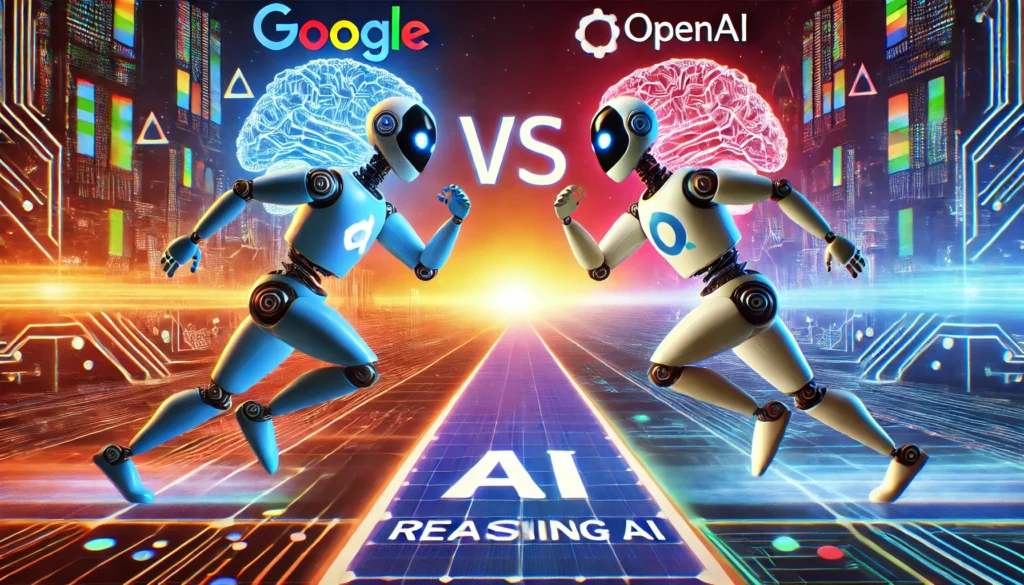Google vs OpenAI: The Race for Advanced Reasoning AI
Artificial Intelligence (AI) is advancing at a lightning speed, and two tech giants—Google and OpenAI—are now in a race to lead the development of next-generation AI technology. Google recently made waves with its efforts to build AI systems that can simulate human reasoning. This shift comes as a direct response to the rapid progress made by OpenAI, known for its breakthrough AI models that have already taken the tech world by storm.
simulate means – “to create certain conditions that exist in real life using computers, models, etc.”
- Learn How to Build Ai Apps – Click Here
Google’s Ambitious Plan to Build Human-Like Reasoning AI
So, what exactly is Google working on?
In simple terms, the company is striving to create AI that can “think” like a human. This means going beyond simple task execution and teaching AI to tackle complex problems by reasoning through each step—just as humans would when solving real-world problems.
For example – When solving a difficult math problem or writing code, you often have to think through several steps before arriving at a solution. Similarly, Google’s vision is to build an AI that instead of following preset instructions, it would be able to break down problems, adjust its approach if necessary, and ultimately come up with a solution.
- Learn How to Build Ai Apps – Click Here
Google working on Advanced Reasoning AI
In recent months, several teams at Google have been working quietly on the development of this reasoning-based AI. While several details remain private, it’s clear that their focus is on building AI systems capable of handling complex, multi-step problems, especially in fields like mathematics and computer programming.
However, Google’s challenge lies in not just making AI smarter, but teaching it to “think” and reason through tasks. This is a significant leap from current AI systems, which are great at specific tasks but struggle with problem-solving and decision-making in unpredictable situations.
- Learn How to Build Ai Apps – Click Here
Chain-of-Thought Prompting: A Key in AI Reasoning

One of the innovative techniques being used in this effort is called chain-of-thought prompting. While it might sound complex, the concept is straightforward. When AI faces a problem, it doesn’t just blurt out an answer immediately. Instead, it pauses, breaks the problem down into smaller steps, and carefully works through each one before giving a solution.
Here’s how this works:
- Breaking it Down: When asked a complex question, the AI divides it into smaller parts or tasks.
- Pause to Process: The AI takes a brief moment to think through each step, just as a human would pause to consider different options.
- Summing it Up: Once it processes everything, the AI then combines the steps to provide the most suitable solution.
This method allows AI to tackle problems in a more human-like manner, making it much more effective for handling complex tasks that require deeper reasoning.
🔥 You can read this docs to learn more about though prompting – Doc1, Doc2
- Learn How to Build Ai Apps – Click Here
Growing Competition Between Google and OpenAI
Google’s recent push into reasoning AI is undoubtedly a response to OpenAI’s rapid success. OpenAI, which has developed powerful AI models like GPT, is already ahead in the race with systems that can generate human-like text and perform advanced reasoning tasks. This puts enormous pressure on Google to accelerate its progress.
As OpenAI continues to set new benchmarks, Google is now in catch-up mode, striving to develop AI that matches, or even exceeds, the capabilities of OpenAI’s models. The competition between these two tech powerhouses is driving innovation and pushing the limits of what AI can achieve.
- Learn How to Build Ai Apps – Click Here
How reasoning AI could change the game?
So, why is there so much focus on developing AI that can reason like a human? The potential impact is enormous. AI with reasoning capabilities could transform several industries by solving problems that are currently too complex for machines.
Here are a few ways reasoning AI could make a difference:
- Education : AI could assist teachers in explaining complex topics and solving intricate problems in an easy way that students can easily understand.
- Healthcare : Reasoning AI could analyze the medical data and provide doctors with insights to improve patient treatment plans.
- Technology : AI systems could automatically debug code, write software, and help developers create more efficient applications.
The possibilities are endless, and reasoning AI could lead to the creation of much smarter, more adaptive machines that can handle increasingly complex challenges.
- Learn How to Build Ai Apps – Click Here
So what’s next?
Since Google continues to work on its new reasoning AI technology, it’s clear that the company is dedicating a significant amount of resources to this project. However, Google has not disclosed the time for it, to be made publicly accessible. Currently, Google is refusing to share much detail about this project.
One thing is for sure: Google is committed to staying ahead in this AI race. As the competition with OpenAI and other big tech companies heats up, we can expect even more breakthroughs in this area in the near future.
- Learn How to Build Ai Apps – Click Here
Conclusion
Google’s development on reasoning AI can be an exciting move into the future of artificial intelligence. Google is trying to solve one of the most significant issues in AI research at the moment by building machines that are capable of thinking and solving problems like humans.
We can expect the AI technology to advance quickly in the near future, changing the way we live, work, and engage in the world.
In the near future, we will be seeing more advancements in AI technology influencing the way we live, work, and engage with the world.


